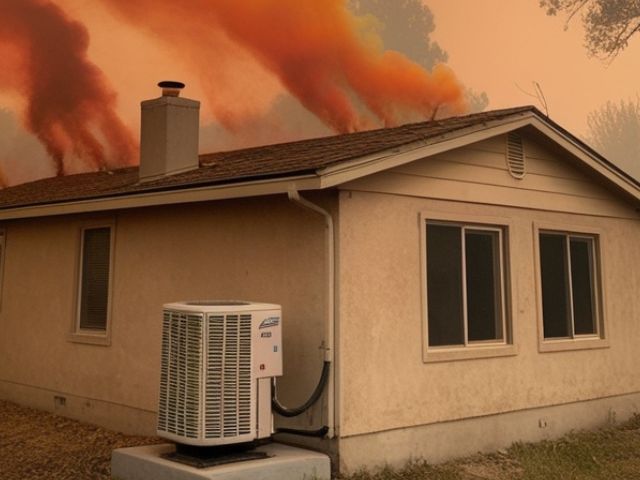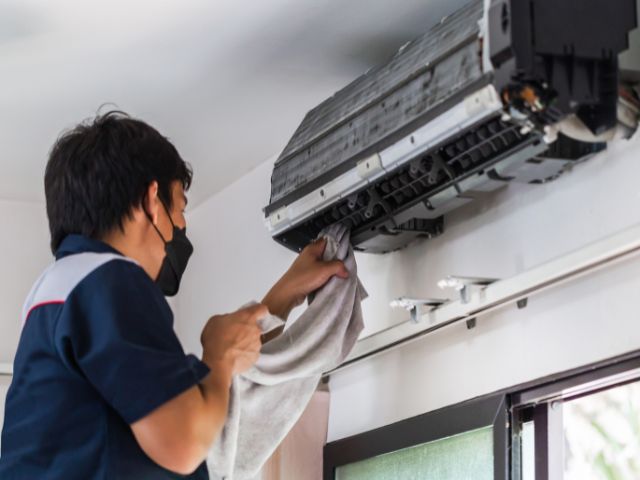Table of Contents
As wildfires continue to grow in frequency and intensity, homeowners must take proactive steps to ensure their safety and the well-being of their property. With the summer heat and wildfire seasons becoming more unpredictable, air conditioning (AC) units are essential to maintaining comfort and air quality. However, homeowners must also recognize that AC systems can play a role in both protecting and compromising their home’s defense against wildfires. In this blog, we will explore crucial wildfire safety tips that every AC user should know to safeguard their home and family from the devastating impact of wildfires.
Understanding the Risks of Wildfires and AC Systems
Wildfires pose significant risks not only due to their immediate threat to life but also from the lasting effects of smoke, debris, and heat. AC units, which typically circulate air throughout the home, can become conduits for carrying harmful airborne particles, such as ash and smoke, directly into your living space. With the increased intensity of wildfires, having a well-maintained AC system becomes a critical part of your home’s defense.
To effectively mitigate the risks posed by wildfires, it is essential to be aware of how your air conditioning unit functions during wildfire seasons and how to prepare it accordingly. Understanding the role of your system will help prevent complications and ensure that it operates efficiently when you need it the most.
Why AC Maintenance Is Essential During Wildfire Seasons
Regular air conditioning maintenance of your unit is essential, particularly during wildfire seasons. A well-maintained system improves air quality and helps filter out harmful pollutants like smoke particles, which can exacerbate respiratory issues. Cleaning and replacing filters, inspecting ducts, and ensuring that the system is operating at peak efficiency are critical steps in maintaining your AC’s reliability.
Air filters are the first line of defense against particles that could be sucked into your system. During wildfire seasons, it’s recommended to use high-efficiency filters, such as HEPA filters, which can trap tiny particles, including ash and soot. These filters can help prevent contaminants from circulating in the air, providing cleaner indoor air for you and your family.

Seal Your Home and Secure Your AC System
One of the most important wildfire safety measures for AC users is ensuring that the home is properly sealed. Sealing gaps and cracks around windows, doors, and other areas helps keep smoke and debris from entering your home through the air system. Ensure that your AC system’s intake is located in a place less vulnerable to smoke, such as on the roof or a high point of your home, to avoid direct exposure to the wildfire’s toxic fumes.
Moreover, ensure that your windows and doors are properly sealed. Use weather stripping and caulk to eliminate potential entry points for smoke. In homes with HVAC systems that have intake ducts, consider covering these ducts with breathable filters or fabric during high-risk periods to minimize the intrusion of wildfire smoke.
Preparing Your AC Unit for Wildfire Smoke
AC systems are often used to filter air, but they cannot filter out the harmful particles from wildfire smoke unless the correct precautions are taken. If you live in an area prone to wildfires, follow these AC preparation steps to minimize damage and maintain indoor air quality:
- Upgrade your air filters: As mentioned, switching to a HEPA filter is crucial. These filters can trap finer particles, such as ash and soot, that other filters might miss.
- Turn off the outside air intake: If your AC system draws air from the outside, close the intake valves to prevent smoke from entering. Instead, use recirculated air from inside the house.
- Increase filter replacement frequency: During wildfire seasons, replace the filters in your air conditioning system more frequently than usual, as they will collect more dust and particles during these times.
- Ensure proper venting: Check your system’s ductwork to ensure there are no obstructions, which could further limit airflow and make it difficult for your AC to maintain a consistent temperature and airflow.
Install an Air Purifier Alongside Your AC System
While an air purifier cannot replace the function of your AC, adding one to your home can significantly improve indoor air quality. A high-quality air purifier equipped with a HEPA filter can work alongside your AC unit to help trap even the smallest particles, such as smoke, ash, and allergens. This addition can provide extra protection against the adverse health effects of wildfire smoke.
When choosing an air purifier, look for units designed to handle wildfire smoke. These devices are specially engineered to trap pollutants that are commonly found in wildfire-affected areas, helping to keep the air in your home clean and safe to breathe.
Keep Your AC System Clean During Wildfire Seasons
Proper cleanliness of your AC system is essential in maintaining optimal airflow and filtering effectiveness. During wildfire seasons, make sure that the evaporator coils, condenser coils, and air ducts are free of dust and debris, which could limit airflow and put additional strain on your AC unit. Clean and maintain your system regularly to ensure it operates efficiently.
Additionally, ensure that your air ducts are free of debris and buildup. A thorough inspection of the ducts before the wildfire season can prevent dirt, ash, and smoke particles from accumulating in the system, which would negatively affect the system’s performance and the quality of indoor air. Investing in professional air duct cleaning services can help eliminate contaminants and improve overall air circulation, keeping your home safe and comfortable during wildfire season.

Monitor Your Indoor Air Quality
While your AC system plays a crucial role in managing indoor air quality, it’s essential to monitor the air quality in your home. Invest in an air quality monitor that can detect pollutants, such as particulate matter and volatile organic compounds (VOCs), which can be released during a wildfire.
If the air quality in your home worsens, consider increasing the use of air purifiers or temporarily leaving windows and doors closed to prevent external pollutants from entering. Keep your AC system running in recirculation mode to avoid drawing in outdoor air.
Create an Emergency Plan for AC Users During Wildfires
While taking the proper precautions can help protect your home and health during wildfire seasons, it’s crucial to have an emergency evacuation plan in place. In the event of a wildfire, if you live in a high-risk area, follow these safety tips:
- Have a plan for your AC system: If a wildfire is imminent, turn off your AC to prevent smoke from being drawn into the system.
- Keep essential documents safe: Store documents related to your AC system, such as maintenance records and warranty information, in a safe, accessible location.
- Stay informed: Sign up for local emergency alerts to stay updated on wildfire risks and evacuation orders.
By taking these proactive steps, AC users can better safeguard their homes from the destructive effects of wildfires while ensuring clean, breathable air indoors.
Conclusion
Wildfire seasons are becoming increasingly unpredictable, making it essential to take proactive steps in safeguarding your home and indoor air quality. By maintaining your AC system, upgrading to HEPA filters, and sealing your home against smoke infiltration, you can significantly reduce the risks associated with wildfire smoke. Investing in air purifiers and monitoring indoor air quality further enhances protection, ensuring a safer, healthier environment for you and your loved ones. Taking these precautions not only helps maintain comfort but also prevents long-term damage to your HVAC system.
If your AC system sustains damage from smoke or debris, timely repairs are crucial to restoring indoor air quality. For emergency AC repair for wildfire damage, trust HVAC Alliance Expert to provide fast and efficient HVAC service. Our team specializes in professional air conditioning services, ensuring your system is running optimally when you need it most. Don’t wait until the damage worsens—contact us today for expert assistance and peace of mind.
FAQs
To prevent smoke from entering, seal gaps around windows and doors, and close the outside air intake on your AC. Use recirculated indoor air and upgrade to high-efficiency filters like HEPA to block harmful particles.
AC maintenance during wildfire seasons ensures that filters are working efficiently to trap smoke and ash. Regular cleaning and filter replacements help improve indoor air quality and protect your health.
Yes, adding an air purifier equipped with a HEPA filter can enhance your AC’s ability to trap smaller particles, like smoke and ash. This combination provides extra protection for your home’s air quality.
During wildfire seasons, replace your AC filters more frequently than usual due to the increased dust and ash. It’s recommended to check and replace them every 1–2 months, depending on the severity of the wildfire season.
If a wildfire is imminent, turn off your AC system to prevent smoke from being drawn in. Additionally, ensure your home is sealed and follow local emergency alerts for evacuation instructions.


